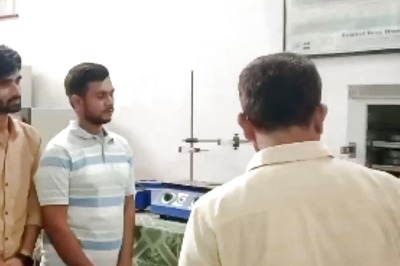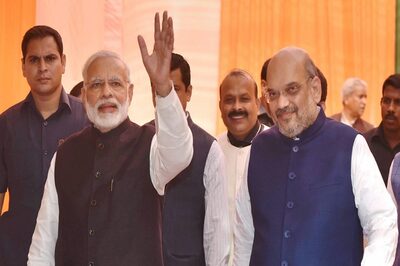
views
The upcoming visit of Nepal’s Prime Minister Pushpa Kamal Dahal ‘Prachanda’ will be crucially important for sorting out the traditional irritants, imbibing ‘mutual empathy’ in India-Nepal ties and scaling up bilateral cooperation. Nepal’s economy is facing deep ‘structural flaws’ and ‘cyclical decline’, making the policymakers and the industry leaders jittery with valid reasons. The recessionary tendency and spectre of a worsening scenario is making it go into a tailspin, however, counting on the macroeconomic fundamentals, the economy is on a path of rebounding despite the negative growth in the last two quarters.
Significance of PM Prachanda’s India Visit
PM Prachanda’s India visit is of utmost importance on the economic front as India’s enhanced partnership will reassure Nepal’s successful transition out of a tough economic phase. A few important partnership agreements are likely in sectors like energy (hydroelectricity projects), infrastructure (road, railway and aviation), banking & financial services (payment related: UPI), agriculture & food processing besides giving a boost to connectivity. To give a fillip to bilateral political-economic cooperation, Prachanda, a seasoned veteran has all the reasons to highlight Nepal’s major accomplishments, especially the peaceful mainstreaming of the Maoist movement into the democratic structure, the integration of guerrillas into the Nepal Army, the transfer of power, the adoption of a Constitution and the emergence of a federal structure.
In recognition of Nepal’s democracy and economy, all these factors will help in building a consensus for deeper economic engagement and partnership. In Nepal, India’s focus for many years has been on non-partisan support for inclusive economic development, interdependence, communication links, people-to-people contacts, and building on the compulsive logic of economic complementarities, especially in hydropower where Nepal has huge but largely unexplored potential. Taking facts into consideration, this visit to India will be quite an occasion for Prachanda to get a progressive framework for resetting bilateral cooperation.
State of Nepal’s economy
Noticeably, Nepal entered into an economic recession for the first time in the last six decades with falling economic output emanated by demand shock, liquidity crunch, balance of payment crisis, high inflation and policy paralysis. As far as NSO’s latest projection is concerned, it keeps the Gross Domestic Product (GDP) growth in tune with 1.9 percent in 2022-23. In the budget, it was estimated to be 8 percent. While Nepal’s economy is in a rebounding phase despite the challenges, NSO’s estimate may get wrong if the industrial output and capital spending are not on course as they are expected to be.
Nepal’s real developmental dilemma lies in its low propensity to reform while keeping the monopolistic structure in key productive sectors, notwithstanding the promises made by the transition from a monarchy to a functional democracy, its economy is neither handled well by the state nor private enterprises. A sad truth remains that Nepal has the pursuit for getting foreign investments but without opening its economy for fair competition (even if not the perfect one) and ushering market reforms. Another fault line is having its front-running industries showing no signs of recognising the export potential and recalibrating their capacity to make Nepal a hub of hope rather than despair. Among the policymakers, a realisation should be that Nepal has no backup of a command economy to support a few major enterprises, and next, the aspirations of people can’t wait for things to get in order with nature’s command and control.
To get the system in order, it would be imperative to have a consensus on making a long-term economic vision for Nepal. This will be made possible by giving an alternative development paradigm to Nepal by recognising the need for a fine balance in having the government and industry work in tandem, despite the frequency of changes in the political order. Kathmandu and provincial elites helming the key government offices should recognise the merit of ‘accountability’, ‘homework’ and ‘rule of law’. They should work for a political economy where the state will act as a facilitator for inclusive economic development.
The China factor
A senior leader like Prachanda is capable of making balanced judgements in his long-term political interests even when his new government adopts a policy of “equi-proximity” with India and China. The truth is that ideological consistency has less and less meaning in the politician’s search for power. However, it should also not be forgotten that Prachanda has, on occasions, spoken with courage and conviction to question senseless opposition to India.
Public opinion in Nepal is now better informed of the reality of Chinese intentions, the risks of falling into a debt trap, and the limitations in terms of Chinese capacities in comparison to India’s. China’s image itself has taken a huge beating in Nepal because of the Covid pandemic, not acting like an ally in times of crisis and imposing a sort of undeclared blockade at major border points in the last few years. However, traditional irritants like the 1950 India-Nepal Treaty of Peace and Friendship and the border issue need not be prolonged but should be sorted out in an open and transparent manner.
Virtue of ‘continuity’ and ‘change’
The Eminent Persons Group (EPG) report, jointly prepared by experts from both India and Nepal, has not been released and it is making news once again before Prachanda’s India visit. Reportedly, Bhekh Bahadur Thapa, a former ambassador who led EPG from the Nepal side announced that the EPG report on India-Nepal relations would be made public unilaterally. Such a move should be avoided and rather joint efforts be made by India and Nepal to review the draft first before making the final version of the EPG report public, based on its merit. In any case, it should not be seen as an ‘irritant’.
Nepal is a transforming country with changing aspirations. India is a player on the global stage. India-Nepal ties are also heading towards major transformations, with new challenges, changing priorities and boundless possibilities. Recognising the virtue of ‘continuity’ and ‘change’ should be the key takeaway of Prachanda’s India visit for resetting the ties for good.
Atul K Thakur is a policy professional, columnist and writer with a special focus on South Asia. Views are personal.




















Comments
0 comment